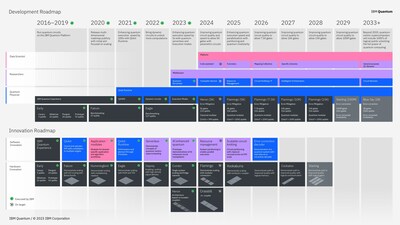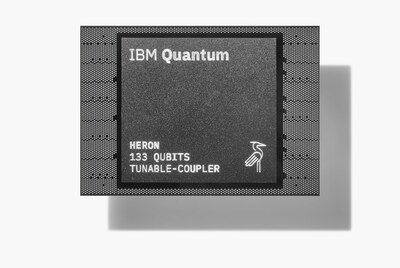IBM Debuts Next-Generation Quantum Processor & IBM Quantum System Two, Extends Roadmap to Advance Era of Quantum Utility
- 'IBM Quantum Heron' offers significant improvements in error reduction, 'IBM Quantum System Two' marks a critical advancement in quantum-centric supercomputing architecture, IBM extends the IBM Quantum Development Roadmap to 2033, Qiskit 1.0 introduces new features for easy and fast execution of quantum circuits
- None.
- University of
Tokyo , Argonne National Laboratory, Fundacion Ikerbasque, Qedma, Algorithmiq, University ofWashington , University ofCologne , Harvard University, UC Berkeley, Q-CTRL demonstrate new research to explore power of utility-scale quantum computing - 'IBM Quantum Heron' is released as IBM's most performant quantum processor in the world, with newly built architecture offering up to five-fold improvement in error reduction over 'IBM Quantum Eagle'
- IBM Quantum System Two begins operation with three IBM Heron processors, designed to bring quantum-centric supercomputing to reality
- Expansion of IBM Quantum Development Roadmap for next ten years prioritizes improvements in gate operations to scale with quality towards advanced error-corrected systems
- Qiskit 1.0 announced, the world's most widely used open-source quantum programming software, with new features to help computational scientists execute quantum circuits with ease and speed
- IBM showcases generative AI models engineered to automate quantum code development with watsonx and optimize quantum circuits
IBM also unveiled IBM Quantum System Two, the company's first modular quantum computer and cornerstone of IBM's quantum-centric supercomputing architecture. The first IBM Quantum System Two, located in
With this critical foundation now in place, along with other breakthroughs in quantum hardware, theory, and software, the company is extending its IBM Quantum Development Roadmap to 2033 with new targets to significantly advance the quality of gate operations. Doing so would increase the size of quantum circuits able to be run and help to realize the full potential of quantum computing at scale.
"We are firmly within the era in which quantum computers are being used as a tool to explore new frontiers of science," said Dario Gil, IBM SVP and Director of Research. "As we continue to advance how quantum systems can scale and deliver value through modular architectures, we will further increase the quality of a utility-scale quantum technology stack – and put it into the hands of our users and partners who will push the boundaries of more complex problems."
As demonstrated by IBM earlier this year on a 127-qubit 'IBM Quantum Eagle' processor, IBM Quantum systems can now serve as a scientific tool to explore utility-scale classes of problems in chemistry, physics, and materials beyond brute force classical simulation of quantum mechanics.
Since that demonstration, leading researchers, scientists, and engineers from organizations including the
This includes experiments already running on the new IBM Quantum Heron 133-qubit processor, which IBM is making available for users today via the cloud. IBM Heron is the first in IBM's new class of performant processors with significantly improved error rates, offering a five-times improvement over the previous best records set by IBM Eagle. Additional IBM Heron processors will join IBM's industry-leading, utility-scale fleet of systems over the course of the next year.
IBM Quantum System Two and Extended IBM Quantum Development Roadmap
IBM Quantum System Two is the foundation of IBM's next generation quantum computing system architecture. It combines scalable cryogenic infrastructure and classical runtime servers with modular qubit control electronics. The new system is a building block for IBM's vision of quantum-centric supercomputing. This architecture combines quantum communication and computation, assisted by classical computing resources, and leverages a middleware layer to appropriately integrate quantum and classical workflows.
As part of the newly expanded ten-year IBM Quantum Development Roadmap, IBM plans for this system to also house IBM's future generations of quantum processors. Also, as part of this roadmap, these future processors are intended to gradually improve the quality of operations they can run to significantly extend the complexity and size of workloads they are capable of handling.
Qiskit and Generative AI to Increase Ease of Quantum Software Programming
Today, IBM is also detailing plans for a new generation of its software stack, within which Qiskit 1.0 will be a pivot point defined by stability and speed. Additionally, and with the goal of democratizing quantum computing development, IBM is announcing Qiskit Patterns.
Qiskit Patterns will serve as a mechanism to allow quantum developers to more easily create code. It is based in a collection of tools to simply map classical problems, optimize them to quantum circuits using Qiskit, executing those circuits using Qiskit Runtime, and then postprocess the results. With Qiskit Patterns, combined with Quantum Serverless, users will be able to build, deploy, and execute workflows integrating classical and quantum computation in different environments, such as cloud or on-prem scenarios. All of these tools will provide building blocks for users to build and run quantum algorithms more easily.
Additionally, IBM is pioneering the use of generative AI for quantum code programming through watsonx, IBM's enterprise AI platform. IBM will integrate generative AI available through watsonx to help automate the development of quantum code for Qiskit. This will be achieved through the finetuning of the IBM Granite model series.
"Generative AI and quantum computing are both reaching an inflection point, presenting us with the opportunity to use the trusted foundation model framework of watsonx to simplify how quantum algorithms can be built for utility-scale exploration," said Jay Gambetta, Vice President and IBM Fellow at IBM. "This is a significant step towards broadening how quantum computing can be accessed and put in the hands of users as an instrument for scientific exploration."
With advanced hardware across IBM's global fleet of 100+ qubit systems, as well as easy-to-use software that IBM is debuting in Qiskit, users and computational scientists can now obtain reliable results from quantum systems as they map increasingly larger and more complex problems to quantum circuits.
About IBM
IBM is a leading provider of global hybrid cloud and AI, and consulting expertise. We help clients in more than 175 countries capitalize on insights from their data, streamline business processes, reduce costs and gain the competitive edge in their industries. More than 4,000 government and corporate entities in critical infrastructure areas such as financial services, telecommunications and healthcare rely on IBM's hybrid cloud platform and Red Hat OpenShift to affect their digital transformations quickly, efficiently and securely. IBM's breakthrough innovations in AI, quantum computing, industry-specific cloud solutions and consulting deliver open and flexible options to our clients. All of this is backed by IBM's long-standing commitment to trust, transparency, responsibility, inclusivity and service.
Visit www.ibm.com for more information.
MEDIA CONTACTS
Erin Angelini
IBM Communications
edlehr@us.ibm.com
Hugh Collins
IBM Communications
hughdcollins@ibm.com
![]() View original content to download multimedia:https://www.prnewswire.com/news-releases/ibm-debuts-next-generation-quantum-processor--ibm-quantum-system-two-extends-roadmap-to-advance-era-of-quantum-utility-302004058.html
View original content to download multimedia:https://www.prnewswire.com/news-releases/ibm-debuts-next-generation-quantum-processor--ibm-quantum-system-two-extends-roadmap-to-advance-era-of-quantum-utility-302004058.html
SOURCE IBM
FAQ
What is the name of the most performant quantum processor in the world recently released by IBM?
How much error reduction improvement does 'IBM Quantum Heron' offer over 'IBM Quantum Eagle'?
What is the name of the new open-source quantum programming software announced by IBM?
What is the purpose of Qiskit Patterns announced by IBM?
How does IBM plan to extend the IBM Quantum Development Roadmap?











